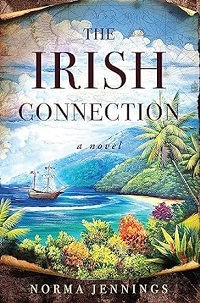Norma Jennings 1873 NW 93rd Way Plantation, FL 33322 daughterofthecaribbean@gmail.com 954-249-7342 THE IRISH CONNECTION Synopsis It is 1847, Ireland is ravaged by the Potato Famine, and hundreds of thousands of poor small farmers and their families are dying of starvation or typhoid fever. Ireland is part of the United Kingdom, with executive power in the hands of politicians who are appointed by the British. Throughout the entire period of the Famine, Ireland exports enormous quantities of food and supplies to England. The problem is not a lack of food, which is plentiful, but the price of it, which is beyond what the poor, whose staple food is potato, can afford. SEAN O’SULLIVAN, a poor potato farmer devastated by the Famine, works in a soup kitchen that keeps hundreds of the sick and starving alive with one cup of soup every three days. O’SULLIVAN travels to far-off places with the soup kitchen, to save lives with a cup of soup. Along the way, he has gut-wrenching encounters. He beats off hungry dogs gnawing at dead bodies at the side of the road, he digs mass graves and buries the starved or disease stricken, and he stops a woman from eating the arm of her dead baby, as starvation and insanity ravages her. Wrapping his mother’s body in burlap, he buries her behind their cabin, moments before the landlord burns it to the ground because he is two shillings short on the rent. In a meeting of wealthy British landlords, he hears them voice concerns about overpopulation, and their reluctance to help feed the starving because they blame the poor Irish for ‘breeding like rabbits’. One solution they discuss is to ship the poor from Ireland, off to Canada, America, or the Caribbean. O’SULLIVAN barely escapes starvation, with his best friend, on a cargo ship that takes live bodies as ballasts (stabilizing weights), on the way back to the Caribbean. A hurricane batters his ship at sea. He’s forced to slay a Pirate who brutally murders his best friend in their bunker. O’SULLIVAN’s ship finally docks in Jamaica. He is penniless and alone. He’s immediately employed by one of the cruelest British planters on the island, who beats and maims his slaves. He struggles to win the trust of slaves by refusing to abuse them. As slave rebellions plague the island, he earns the trust of Maroons from the Maroon village nearby. Slavery is soon abolished, and angry planters, under the leadership of cruel, bigoted British Governor, EDWARD JOHN EYRE, do everything to subjugate free blacks and deny them any rights. O’SULLIVAN watches the lynching, perpetrated by EYRE, of three young, African Jamaican activists, whose only crime was to fight for justice and human rights. This pushes him to wage his own quiet war for the rights of African Jamaicans. After abolishing slavery, Britain pays 6,616,927 pounds to the planters, ‘for the inconvenience and loss they are expected to suffer when they no longer controlled the forced labor which had been the mainstay of their lifestyles’. Many planters take the money and run, abandoning the plantations. Africans brought to the island, beaten and maimed to perform forced labor in the fields, get nothing. O’SULLIVAN partners with another Irishman, GAVIN RYAN, and purchases two abandoned plantations. He names the properties PIMENTO BAY, and converts them into a thriving farming community and village, with parcels of land owned by his African Jamaican ex-slaves. All this, during a time when blacks are refused the right to own land, but they are denied the right to vote unless they do own land. How will O’SULLIVAN maintain PIMENTO BAY, when more rebellions are looming under a powerful new human rights activist named Marcus Garvey? All this, when Britain is going through an Industrial Revolution. The English working classes are rebelling for their rights and see the African Jamaican fight for justice as similar to their own. Poor, working-class Brits show solidarity by burning the cruel and bigoted, EYRE, in effigy, at Hyde Park.
Books
THE IRISH CONNECTION by Norma Jennings
Product details
- Publisher : Moonshine Cove Publishing, LLC (July 4, 2023)
- Language : English
- Paperback : 264 pages






Reviews
There are no reviews yet.